Saman Mohsenirad PhD Defense

On Monday, September 15, 2025, Saman Mohsenirad
successfully defended his PhD thesis on
''Heterogeneous Decision-Making in Socio-Technical Systems Methodologies for Efficiency Measurement and Decision Analysis with Mixed Data''.
This dissertation advances the performance evaluation of complex socio-technical systems (STSs) by integrating systems theory with methodological innovations in Data Envelopment Analysis (DEA). Traditional DEA models, while robust in assessing relative efficiency across multiple inputs and outputs, implicitly assume homogeneity among decision-making units (DMUs) and precise, ratio-scaled data. These assumptions fall short when confronted with the realities of STSs, which are characterized by behavioral heterogeneity, contextual variability, mixed-scale and imprecise data, and emergent performance shaped by environmental conditions. Recognizing these challenges, this research reconceptualizes DEA within a systems-theoretic framework and proposes four interrelated methodological advancements that address the epistemological and practical limitations of conventional performance analysis.
The first contribution introduces a novel statistical framework for testing heterogeneity among DMUs using slack-based diagnostics and nonparametric inference. This approach empirically verifies whether observed units operate under a shared technology, providing a rigorous foundation for clustering, meta-frontier analysis, and group-specific benchmarking. The second contribution develops a multivariate fuzzy DEA methodology that enables the inclusion of ordinal, categorical, and imprecise data through the integration of Multiple Factor Analysis (MFA), fuzzy set theory, and clustering algorithms. This model enhances interpretability and robustness in efficiency evaluation under data ambiguity and contextual complexity. Third, the dissertation proposes a hybrid SEM–DEA framework to estimate and adjust for environmental influences on performance. Structural Equation Modeling (SEM) is used to quantify both direct and indirect effects of contextual variables on inputs and outputs, allowing for what-if scenario modeling and fairer cross-unit comparisons. The fourth and final contribution incorporates a behavioral modeling dimension by applying machine learning techniques—specifically Random Forests and decision tree analysis—to predict household evacuation behavior in response to Hurricane Irma. It highlights adaptive decision-making under uncertainty and the value of linking behavioral insights with performance analysis.
Empirical demonstrations focus on disaster evacuation as a prototypical socio-technical system, where decision-making interacts with infrastructure, resource constraints, and diverse perceptual frameworks. Across all contributions, this research maintains a commitment to interpretability, diagnostic clarity, and systems alignment. By situating DEA within a broader systems paradigm and extending its methodological repertoire, this dissertation offers a unified analytical lens to capture efficiency, contextual sensitivity, and behavioral realism. The resulting framework provides both theoretical insight and practical tools for evaluating performance in complex, human-centered environments—advancing the applicability of efficiency analysis in engineering, policy, and socio-technical design.
Saman (center) with members of his assesment committee, Prof. Eileen M. Van Aken and Dr Taylan G. Topcu




